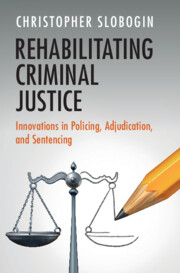Book contents
8 - Rationalizing Plea Bargaining
from Part II - Adjudication
Published online by Cambridge University Press: 17 April 2025
Summary
This final chapter in Part II looks at plea bargaining, which determines the outcome in most criminal cases in the United States. The main argument in Chapter 8 is that plea bargaining is incompatible with both retributivism and adversarialism, the major substantive and procedural goals of American criminal justice. It undermines retributivism because it implicitly posits that an offender “deserves” at least two punishments. It undermines adversarialism (here used in its positive sense as the process of ensuring both parties are allowed to make their case) because it eliminates trials. Thus, either plea bargaining should be prohibited or the system’s goals should be changed. Introducing the concept of “preventive justice” that permeates the rest of the book, this chapter imagines a system in which retribution is no longer the lodestar of punishment and party control of the process is no longer the desideratum of adjudication. If, instead, plea bargaining were seen as a mechanism for implementing a sentencing regime focused primarily on individual crime prevention rather than retribution (as in the salad days of indeterminate sentencing), and if it were filtered through a European-style system that is inquisitorial (i.e., judicially monitored) rather than run by the adversaries, it would have a much greater chance of evolving into a procedurally coherent mechanism for achieving substantively accurate results. Guilty pleas would be abolished and trials required in all serious cases. Although bargaining with the goal of influencing the judge would still continue, it would no longer be the one-sided take-it-or-leave-it exchange it is today. Instead, it would focus on the dispositions that best balance protection of the public with defendants’ need for certainty and willingness to change.
- Type
- Chapter
- Information
- Rehabilitating Criminal JusticeInnovations in Policing, Adjudication, and Sentencing, pp. 121 - 138Publisher: Cambridge University PressPrint publication year: 2025

